|
|
|
Sort Order |
|
|
|
Items / Page
|
|
|
|
|
|
|
| Srl | Item |
| 1 |
ID:
152032
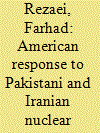

|
|
|
|
|
| Summary/Abstract |
This article explores the paradox in the reaction of the United States to the two different proliferation cases: Pakistan's proliferation and Iran's weaponization effort. The article tries to find answer to the following key question; why the United States, as one of the guardians of the Non-proliferation Treaty (NPT) which would prefer to see a region that is entirely free of weapons of mass destruction, ultimately has accepted Pakistan's proliferation, while imposed considerable amount of pressure to stop Iran from acquiring nuclear weapons.
|
|
|
|
|
|
|
|
|
|
|
|
|
|
|
|
| 2 |
ID:
152033
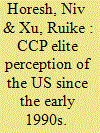

|
|
|
|
|
| Summary/Abstract |
This article juxtaposes two of the most influential yet under-studied America watchers within the top echelon of the Chinese Communist Party (CCP), Wang Huning and Zheng Bijian. To be sure, the two have indelibly shaped CCP attitudes, yet surprisingly enough, although Zheng has been written about extensively in the English language, Wang has hitherto largely remained outside academics’ purview. This article also aims, in passing, to explore linkages between Wang and Zheng ideas and those of other well- known America watchers like Liu Mingfu and Yan Xuetong. The comparison offers clues as to the extent to which the current advisory shaping CCP thinking on the US differs from the previous generation, and as to whether CCP thinking is un-American or anti-American in essence. The conclusions ties the study together by arguing, based on Wang and Zheng's views, that New Confucianism may shape Chinese society in the future
|
|
|
|
|
|
|
|
|
|
|
|
|
|
|
|
| 3 |
ID:
152031
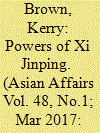

|
|
|
|
|
| Summary/Abstract |
Since becoming head of the Communist Party in China in late 2012, Xi Jinping has accrued an impressive raft of titles. He has been compared to the founder of the regime, Mao Zedong, and is seen by some as sitting at the centre of a network of different power sources. But is power as personalised as this model makes out in contemporary China, with all its complexity and diversity? And can one person really rule the continental sized country in this paternalistic way? This article argues that Xi's powers are intrinsically linked with the organisation that he leads and which his power is sourced in – the Party itself. Far from him being the emperor of modern China, it is the Communist Party which acts as the all-seeing, all-powerful ruler. In this model, Xi is its servant, not its master.
|
|
|
|
|
|
|
|
|
|
|
|
|
|
|
|
| 4 |
ID:
152035
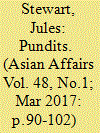

|
|
|
|
|
| Summary/Abstract |
This article provides an overview of the development of the exploration, mapping and surveying of the frontier territories of India in the 19th century and the context of the Great Game with Russia. It pays particular attention to the Pundits, the native surveyors trained by British officers who made long surveying journeys into the borderlands of the Himalayas and Tibet. It gives an account of the explorations of pundits including Nain Singh, Kishen Singh, Sarat Chandra Das, Kintup, and Ugyen Gatso.
|
|
|
|
|
|
|
|
|
|
|
|
|
|
|
|
| 5 |
ID:
152036
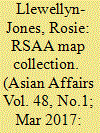

|
|
|
|
|
| Summary/Abstract |
In the century since its foundation, the Royal Society for Asian Affairs has amassed a collection of over 1,000 historic maps. This illustrated article by the Society's archivist provides an introduction to a number of the more important maps in the collection, including General Sam Browne's map indicating the invasion routes of Afghanistan in the Second Afghan War; rare maps of Turkey in the 19th and early 20th century; Egypt; the Arabian Peninsula; India; and Central Asia.
|
|
|
|
|
|
|
|
|
|
|
|
|
|
|
|
| 6 |
ID:
152037


|
|
|
|
|
| Summary/Abstract |
This article provides an account of the 2016 RSAA tour to Bhutan. It includes: a brief history of the country; an account of travel including visits to Paro, Punakha, Bumthang, Trongsa, Gangtey, Punakha, and Thimphu, and reflections on the current state of the country based on the tour.
|
|
|
|
|
|
|
|
|
|
|
|
|
|
|
|
| 7 |
ID:
152034
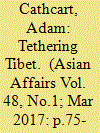

|
|
|
|
|
| Summary/Abstract |
Before Liu Shengqi (柳陞祺) became the early PRC's foremost historian of Tibet, he was an English-language secretary in Lhasa for the Nationalist Government's Commission on Mongolia and Tibet. His travels and assessment of Han-Tibetan relations in and around Lhasa provide a unique perspective on Tibet's tenuous relationship with the Chinese central government from 1945 until 1949. With the 2010 publication of Liu's recollections in Lhasa (in Chinese), a new window is opened on the literature on Tibet's history -- and assertions of Guomindang power in the region -- in the period just preceding the traumatic collision with Maoism.
|
|
|
|
|
|
|
|
|
|
|
|
|
|
|
|
| 8 |
ID:
152030


|
|
|
|
|
| Summary/Abstract |
The 15th July coup attempt in Turkey has added another layer of complexity to the conundrum that is Turkish politics. Since the coup attempt there have been several DAESH and PKK attacks in Turkey, including the assassination of the Russian Ambassador. The country continues to wage war with both terror organizations, whilst trying to pass a new constitution. In this whirlwind of history, many of the questions that lie at the heart of the coup attempt seem sidelined. There have been waves of purges since July, and it is believed that the high number of terror attacks are linked to a weakened intelligence establishment. The following essay attempts to give a brief description of the Gülen movement which, according to several testimonies, was behind the coup attempt. It tries to explain the political structures in Turkey that have always been wedded to military power, and that led to a supposedly religious organization gain so much power. It also tries to sketch a history Turkish people's reactions to military coups and how and why 15th July was different.
|
|
|
|
|
|
|
|
|
|
|
|
|
|
|
|
|
|
|
|
|